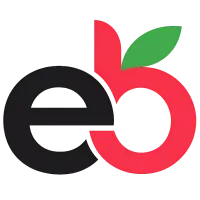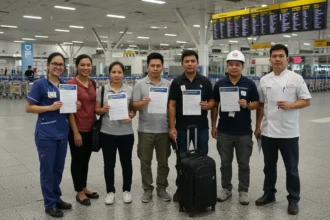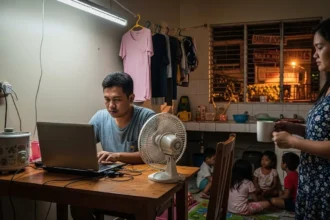For fresh graduates and young professionals, stepping into the 2025 workplace can feel both exciting and overwhelming. Job listings ask for skills you’ve barely heard of, competition isn’t just with kababayans but also with global talent, and new tools like AI and digital platforms keep changing the way we work.
- 1️⃣ 💻 Digital Fluency & Tech Adaptability
- 2️⃣ 🌐 Communication & Collaboration (Online & Offline)
- 3️⃣ 📊 Critical Thinking & Problem-Solving
- 4️⃣ 💡 Creativity & Innovation
- 5️⃣ 🤝 Emotional Intelligence (EQ) & Leadership Potential
- 6️⃣ 📚 Continuous Learning & Career Agility
- 7️⃣ 💵 Financial Literacy & Professional Responsibility
- ❓ Frequently Asked Questions
- ❤️ Final Say – Building Your Future, One Skill at a Time
But here’s the good news: you don’t need decades of experience to stand out. Employers today are looking for professionals who can adapt, learn fast, and bring value beyond their diplomas. The right mix of hard and soft skills can open doors – whether you’re starting in a corporate job in Ortigas, freelancing online from your hometown, or exploring side hustles to grow your income.
This guide will walk you through the Top 7 essential skills every young Filipino professional must build in 2025. These aren’t abstract theories – they’re practical, actionable, and proven to help you grow in your career. Think of it as your roadmap to thriving in today’s fast-changing world of work.
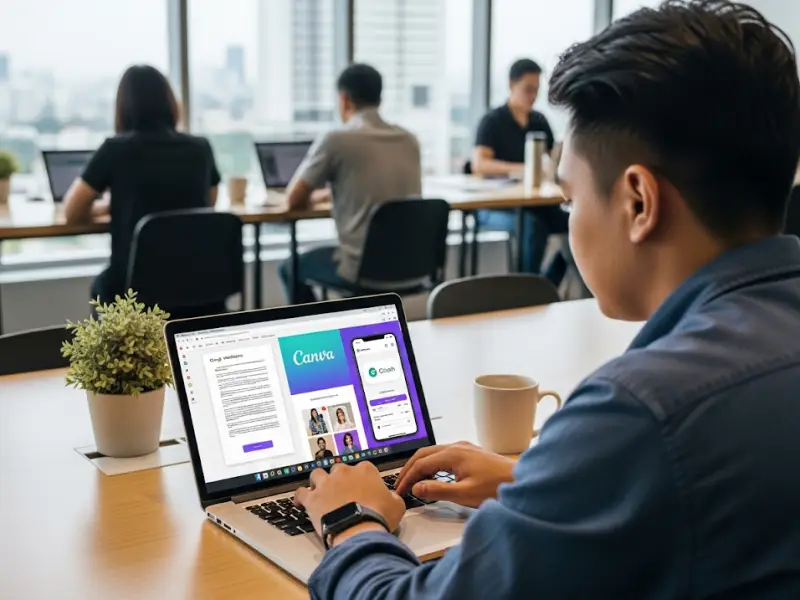
1️⃣ 💻 Digital Fluency & Tech Adaptability
In today’s workplace, being “techie” is no longer optional – it’s expected. Employers assume you already know how to use basic tools like email and spreadsheets. What makes you stand out in 2025 is your ability to quickly learn and adapt to new digital platforms.
Think of how fast tools change: yesterday it was Zoom, today it’s Microsoft Teams or Google Meet with AI summaries. Canva is now a must for quick designs, and apps like Trello or Notion are the backbone of project collaboration. In finance and payments, GCash, Maya, and even ShopeePay are integrated into business transactions.
👉 Why it matters: Companies want people who don’t freeze when faced with new software. If your boss asks, “Can you learn this app by tomorrow?” – you should be able to say, “Yes, I’ll figure it out.” This adaptability makes you reliable in a digital-first world.
Practical Ways to Build This Skill
-
Stay curious: Whenever you encounter a new app at work, don’t wait for training. Explore it, click around, watch a 10-minute YouTube tutorial.
-
Experiment with AI tools: Play with ChatGPT or Gemini to speed up writing, research, or brainstorming. Learn prompt basics – this will be a key skill for the next decade.
-
Track trends: Follow tech blogs, LinkedIn updates, or even TikTok tips on productivity hacks. Small doses keep you updated.
💡 Career tip: Being digitally fluent isn’t about knowing everything. It’s about confidence in learning fast. If you can adapt quickly, you’ll always stay relevant – kahit pa may bagong app every year.

2️⃣ 🌐 Communication & Collaboration (Online & Offline)
No matter how good you are at your job, your career growth depends a lot on how well you work with people. In 2025, this means being just as effective on Zoom or Slack as you are in face-to-face meetings.
Strong communication isn’t just about speaking English fluently – it’s about being clear, respectful, and professional whether you’re writing an email, chatting with a teammate, or presenting in front of your boss. Filipinos have a natural advantage here: our culture values pakikisama (getting along well with others), and that makes us great team players. The key is learning how to balance that warmth with professional clarity.
👉 Why it matters: Employers prefer someone who can handle clients, manage cross-cultural teams, and resolve conflicts smoothly. A junior staff who can confidently speak in meetings, reply to emails without errors, and collaborate well is often trusted with bigger responsibilities earlier.
Practical Ways to Build This Skill
-
Practice professional writing: Avoid one-liner emails like “Noted” or “Okay po.” Instead, be clear: “Thanks, I’ll update the file today and send it back by 3PM.”
-
Speak up in meetings: Even a short update like “Our team finished the draft earlier than expected” shows initiative.
-
Learn cultural awareness: If you work with foreign clients, understand their work habits. For example, Western clients may prefer direct answers, while Asian clients may value politeness and context.
-
Don’t forget non-verbal cues: Good posture, eye contact, and an attentive expression matter – whether on Zoom or in person.
📝 Common Communication Mistakes vs. Better Alternatives
| Situation | Common Mistake | Better Alternative | Why It Works |
|---|---|---|---|
| Email reply | “Noted.” / “Okay po.” | “Thanks, I’ll update the file today and send it back by 3PM.” | Shows accountability and clarity of next steps. |
| Online meeting | Staying quiet the whole time | “Our team finished the draft earlier than expected, I’ll send it after this call.” | Builds confidence and visibility with the team. |
| Chat response | “Kayo na bahala.” (You decide.) | “I suggest Option A because it’s cheaper, but Option B is faster. What do you think?” | Adds value by showing analysis before deferring. |
| Talking to a foreign client | Overly polite but vague: “Yes, we’ll try our best po.” | “Yes, we can deliver by Wednesday. If there’s any delay, I’ll update you immediately.” | Direct yet professional, builds client trust. |
| Giving feedback | “Mali ito.” (This is wrong.) | “This part looks good. Let’s improve the wording here to make it clearer.” | Encourages collaboration instead of discouragement. |
💡 Career tip: Confidence in communication grows with practice. Start small – reply to emails more thoughtfully, join discussions, or volunteer to share updates. Over time, you’ll be seen not just as a doer, but as a professional who can lead conversations and collaborate effectively.

3️⃣ 📊 Critical Thinking & Problem-Solving
One of the biggest complaints managers have today is this: “Some employees wait for instructions instead of figuring things out.” In 2025, companies don’t just want workers who follow orders – they need professionals who can analyze problems, think ahead, and propose solutions.
Critical thinking means looking at a situation and asking: “What’s really happening here? What options do we have? What’s the smartest way forward?” It’s not about being the smartest in the room – it’s about being practical, resourceful, and confident enough to suggest ideas.
👉 Why it matters: Filipino professionals often work with limited resources, whether in a startup, a corporate team, or freelancing. Employers value those who can diskarte – turning challenges into opportunities, like finding a cheaper supplier, creating a faster workflow, or suggesting a new tool to solve recurring problems.
Practical Ways to Build This Skill
-
Ask better questions: Instead of just saying, “What do I do next?” try, “Here are two options I see – which one works better?”
-
Break down problems: Use the “5 Whys” method (ask “Why?” five times) to get to the root of an issue instead of fixing surface-level symptoms.
-
Play with scenarios: Before making a decision, ask: “If I choose this path, what could go wrong?” Anticipating problems helps you look prepared.
-
Learn from mistakes: If a project failed, review what went wrong, not to blame, but to prevent it from happening again.
💡 Career tip: Managers notice when someone is solution-oriented. If you’re the person who not only reports problems but also brings possible solutions, you’ll quickly earn trust and open doors to leadership roles.

4️⃣ 💡 Creativity & Innovation
Creativity isn’t just about painting, writing songs, or being “artsy.” In the modern workplace, creativity means finding new ways to solve old problems – and that’s where Filipinos shine. Our natural diskarte (resourcefulness) is a form of creativity that companies truly value.
In 2025, employers are looking for people who can bring fresh ideas to the table, whether it’s improving a marketing campaign, finding a cheaper supplier, or figuring out how to automate repetitive reports. Innovation doesn’t always mean something groundbreaking – sometimes it’s just spotting a small tweak that saves the team time or money.
👉 Why it matters: Businesses thrive on people who can think outside the box. A junior employee with creative solutions can make as much impact as a senior one who only follows the “usual” way of doing things.
Practical Ways to Build This Skill
-
Observe & Improve: Look at how tasks are currently done. Ask yourself, “Is there a faster, cheaper, or smarter way?”
-
Learn from trends: Follow viral TikTok or Instagram content – not just for fun, but to see what ideas catch attention. Apply the same principles in work projects.
-
Practice small innovations: Automate a simple Excel sheet, create a Canva template for reports, or suggest a new process in team meetings.
-
Keep experimenting: Not every idea will work. But even a “failed” experiment teaches you something valuable.
💡 Career tip: Creativity + practicality is the winning combo. Employers love when you’re not only full of ideas but also know how to execute them with limited resources – very Pinoy style.

5️⃣ 🤝 Emotional Intelligence (EQ) & Leadership Potential
In a world full of smart professionals, what often separates good employees from great leaders is emotional intelligence. EQ is the ability to understand and manage your own emotions – and to recognize and respond to the emotions of others.
For young Filipinos stepping into the workplace, this matters more than ever. Whether you’re dealing with a stressed teammate, a demanding client, or even your own burnout, having EQ means staying calm, empathetic, and solution-focused. Combine this with malasakit (genuine concern), and you naturally stand out as someone with leadership potential, even without the title “manager.”
👉 Why it matters: Companies promote people they trust, not just people who can do the job. If you’re seen as someone who can manage stress, resolve conflicts, and motivate others, you’ll be tapped for bigger opportunities earlier in your career.
Practical Ways to Build This Skill
-
Pause before reacting: Instead of firing back an annoyed email, take a deep breath and reframe your response.
-
Listen actively: Don’t just wait for your turn to speak – really hear what your teammate or client is saying. Sometimes, the real issue is beneath the surface.
-
Show empathy: A simple “I understand why you feel that way, let’s fix this together” can diffuse tension and build trust.
-
Practice self-awareness: Recognize when you’re stressed or frustrated, so it doesn’t spill into your work or relationships.
📝 Low EQ vs. High EQ in Common Workplace Scenarios
| Scenario | Low EQ Response | High EQ Response | Why It Matters |
|---|---|---|---|
| Teammate misses a deadline | “Ano ba yan? Lagi kang late.” | “I noticed you’re struggling with the timeline – want me to help prioritize tasks?” | Builds trust instead of resentment. |
| Client gives harsh feedback | “But we followed your instructions.” | “Thanks for pointing that out. Let’s adjust based on your feedback.” | Shows professionalism and adaptability. |
| Personal stress affects mood | Snaps at coworkers without explanation | “I’m feeling overwhelmed right now, I’ll step out for a few minutes.” | Models self-awareness and control. |
| Team conflict arises | Chooses sides and spreads chismis | Mediates calmly: “Let’s hear both perspectives so we can find a solution.” | Resolves conflict and builds credibility. |
| Boss asks for extra task | Complains immediately: “Trabaho na naman!” | “Sure, I can handle this – but can we set a deadline so I can balance my other tasks?” | Shows initiative but with boundaries. |
💡 Career tip: Leadership doesn’t start with a title – it starts with influence. When people feel safe, supported, and motivated around you, you’re already leading.

6️⃣ 📚 Continuous Learning & Career Agility
In 2025, the workplace is changing faster than ever. A skill that’s in-demand today might be outdated tomorrow. That’s why the most successful young professionals are not the ones who know everything, but the ones who are willing to keep learning and adapting.
Continuous learning means being proactive about upskilling – taking online courses, watching tutorials, or even just experimenting with new tools. Career agility, on the other hand, is about being open to shifting paths when opportunities arise – like moving from BPO work into data analytics, or from teaching into digital marketing.
👉 Why it matters: Filipino workers are highly sought after globally because of our adaptability. If you combine that with a hunger for learning, you future-proof your career. Employers notice when you’re curious, updated, and flexible – and they’ll choose you over someone who refuses to grow.
Practical Ways to Build This Skill
-
Free resources are everywhere: Use YouTube, Coursera, and Google free courses to learn in-demand skills.
-
Invest in certifications: Even short online badges (Google, LinkedIn Learning, HubSpot) look great on your resume and LinkedIn profile.
-
Stay updated: Follow industry leaders, podcasts, or local groups in your field.
-
Embrace career shifts: Don’t be afraid to pivot. Many Filipinos started in one industry and found better opportunities in another.
💡 Career tip: Block at least 1–2 hours a week for “learning time.” Treat it like a meeting with yourself – because your future self will thank you.
7️⃣ 💵 Financial Literacy & Professional Responsibility
Being good at your job is one thing. But if your sweldo disappears before the 15th, stress follows you to work. Employers (and clients) value professionals who are not just skilled but also responsible with money and commitments. Why? Because financial stability often translates to reliability and focus on the job.
For young Filipinos, mastering financial literacy early means less utang, less stress, and more freedom to pursue bigger goals – whether it’s further studies, travel, or starting a side business.
👉 Why it matters: Money habits affect your career. An employee who knows how to manage salary responsibly is less likely to be distracted, burnt out, or desperate for quick fixes. Professional responsibility also extends to being trustworthy with company resources, deadlines, and client accounts.
📝 Sample Monthly Budget for a ₱30,000 Salary
| Category | Suggested % | Example Allocation (₱30K Salary) | Notes |
|---|---|---|---|
| Needs (rent, food, bills, transport) | 50% | ₱15,000 | Prioritize rent, groceries, utilities, and daily commute/Grab. |
| Wants (leisure, shopping, eating out) | 30% | ₱9,000 | Include coffee runs, weekend food trips, or Netflix subscription. |
| Savings & Investments | 20% | ₱6,000 | Start an emergency fund, invest in MP2, or open a digital bank savings account. |
💡 Quick Tip: If you’re supporting family (common for many young Pinoys), adjust the “Wants” portion and protect your “Savings” portion as much as possible. Even ₱1,000–₂,000 a month consistently saved grows over time.
Practical Ways to Build This Skill
-
Track your money: Use free apps (Gcash, Maya, Money Manager) or a simple notebook.
-
Avoid lifestyle inflation: Just because your salary increased doesn’t mean gastos should double.
-
Learn about investments: Start small with Pag-IBIG MP2, mutual funds, or beginner-friendly apps.
-
Be professional with finances at work: File reimbursements properly, avoid company resource abuse, and always be transparent.
💡 Career tip: Employers notice when you’re financially and professionally responsible – it reflects reliability, discipline, and maturity.
❓ Frequently Asked Questions
-
Do I really need all 7 skills right away?
Not necessarily. Start with one or two – like communication and digital fluency – and build the rest gradually as you gain work experience. -
How do I practice communication if I’m shy?
Join small discussions at work, volunteer to present short updates, or practice with friends online. Confidence grows with small, repeated exposure. -
I’m not good with tech – can I still survive in 2025?
Yes, but you’ll need to keep learning. Start with everyday apps (Google Docs, Canva, GCash) before moving into advanced tools. Step by step works best. -
What if my job doesn’t allow much creativity?
Creativity isn’t just for “creative” jobs. You can innovate by simplifying reports, suggesting new processes, or finding ways to save the team time and effort. -
How do I show leadership if I’m not a manager yet?
Start small: volunteer for tasks, mentor a new teammate, or be the one who calms the group when things get stressful. Leadership is influence, not a title. -
Is it really important to keep studying after graduation?
Absolutely. Continuous learning keeps you relevant. The job market changes quickly – upskilling ensures you won’t get left behind. -
What’s the best way to manage money if I’m earning only ₱20K–₱30K?
Follow the 50-30-20 rule: 50% for needs, 30% for wants, 20% for savings/investments. Even small, consistent savings make a big difference over time. -
How can I avoid burnout while working and studying at the same time?
Time blocking helps. Dedicate fixed hours for learning, work, and rest. Don’t forget to take breaks and recharge – balance is key. -
Will employers really notice if I have these skills?
Yes. Recruiters and managers often choose candidates not just for degrees, but for adaptability, EQ, and problem-solving – the “soft skills” that make teams succeed. -
What’s the fastest skill to build that makes the biggest impact?
Communication. If you can explain ideas clearly, collaborate well, and present yourself professionally, doors open faster – no matter what industry you’re in.
❤️ Final Say – Building Your Future, One Skill at a Time
The truth is, no single skill will guarantee success. But when you start combining digital fluency, communication, problem-solving, creativity, emotional intelligence, continuous learning, and financial responsibility – you set yourself apart.
As young Filipino professionals, we carry with us diskarte, resilience, and malasakit – traits that make us shine not just locally but globally. These skills are the modern upgrades to those natural strengths, helping us thrive in workplaces that are fast-changing and competitive.
Remember: careers are not built overnight. They’re shaped little by little, through habits, choices, and skills you invest in today. So pick one area to start improving this week, practice it consistently, and watch yourself grow.
Kaya mo ‘yan. The future of work in the Philippines isn’t just about surviving – it’s about excelling. And with these 7 essential skills, you’re more than ready to claim your place in it.
